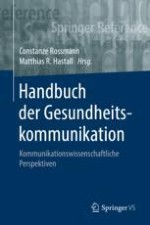2019 | OriginalPaper | Buchkapitel
Kommunikation über Organspende
verfasst von : Lisa Meyer
Erschienen in: Handbuch der Gesundheitskommunikation
Verlag: Springer Fachmedien Wiesbaden
Aktivieren Sie unsere intelligente Suche, um passende Fachinhalte oder Patente zu finden.
Wählen Sie Textabschnitte aus um mit Künstlicher Intelligenz passenden Patente zu finden. powered by
Markieren Sie Textabschnitte, um KI-gestützt weitere passende Inhalte zu finden. powered by
